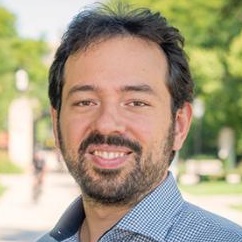Seminar Date: Tuesday, January 17, 2023
Time: 11:00 am
Location: Zoom
Talk Title: First-principles Studies of Quantum Point Defects
Zoom link

Bio:
Marco Govoni is Assistant Scientist in the Materials Science Division and Center for Molecular Engineering. Marco is a materials scientist with experience in interdisciplinary projects at the crossroads between physics, chemistry, computer science, mathematics, and data science. He develops predictive modeling techniques based on first principles numerical simulations to help design advanced materials for renewable energy, water, and quantum information technologies.
Abstract:
We present first-principles calculations of spin-defects in solids carried out on noisy intermediate-scale quantum computers coupled to pre-exascale systems. We focus on point defects in diamond and silicon carbide, which are of interest for the realization of quantum technologies. A comprehensive description of the optical cycle of spin polarization in solids requires the understanding of the atomistic structure and electronic states with different spin multiplicity, including singlet states which are particularly challenging from a theoretical standpoint. We discuss the quantum defect embedding theory (QDET) which allows us to derive an effective Hamiltonian that describes singlet and triplet low-lying excitations of a point defect in a periodic crystal. We apply QDET with a double counting scheme derived within the G0W0 approximation to several defects in diamond, showing the robustness of the method. We discuss how to carry-out QDET calculations on GPUs and on noisy intermediate-scale quantum computers with noise mitigation. We also discuss a general framework, based on spin-flip time-dependent density functional theory, to determine the excited state potential energy surfaces of the singlet states of spin-defects; this allows us to predict the vibrationally resolved absorption spectrum between singlet shelving states of the nitrogen-vacancy center in diamond. The results show that QDET, as implemented in the WEST code (http://west-code.org), is a promising approach to investigate correlated excitations of defects in solids.

